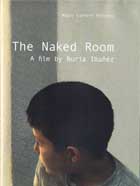
The Naked Room 2013
Distributed by Magic Lantern Films, PO Box 8567, New York, NY 10116; 646-926-6760
Produced by Nuria Ibáñez
Directed by Nuria Ibáñez
DVD , color, 67 min.
College - General Adult
Adolescents, Child Abuse, Children, Documentaries, Counseling, Family Relations, Latin Americans, Mental Health
Date Entered: 10/29/2014
Reviewed by Brandon West, Instructional Design Librarian, State University of New York at OswegoThe Naked Room is a minimalist documentary that captures the heartbreaking truths behind children suffering from mental illness. Set in a Mexico City hospital, a pediatric therapist interviews children that are suffering from a variety of problems, including suicidal tendencies, poor body image, depression, violent behavior, confusion over sexual identity and more. This documentary focuses on the raw emotionality of the children and their parents through a fixed, close up perspective that make the children the only thing seen on-screen. The effect of this style is powerful and saddening, as the children’s interchangeably angry, somber, and confused expressions help illustrate the complexity behind their stories.
Over the course of this documentary, there are over a dozen children interviewed. Many of them seem to have been previous patients at the hospital and are following up with the therapist. While the therapist gently solicits answers out of the patients, there are never interpretations, behavioral labels, or suggested treatments discussed. By doing this, the focus shifts from an analysis of why the children are being treated to focusing on their stories. Occasionally, the children’s parents are interviewed, which help shed insight onto the issues the children are facing. There is some discomfort hearing the parents discuss their children, particularly in the instances where the parents may have played a role in their child’s distress.
The documentary begins with an interview of a young teenage girl who suffers from poor body image. She describes how she thinks she looks ugly because her collar bones are not visible and because she is no longer as skinny as she was during her prepubescent years. In the following interview, a seventeen year old female describes a traumatizing three day abduction by some boys who sexually abused her. She describes how the police did not believe her story when she was rescued and how her religious father blamed her for the incident when she returned home. Next, a young boy recounts how his father threatened to abandon him after wetting the bed, which has lead the boy to commit other defiant behaviors. These are only a few examples of the children’s stories. As a viewer, it is easy to get upset after hearing these tales, which many seem to stem from some sort of abuse. As there are so many children interviewed over the course of the film, it is difficult to really understand what is going on with them; however, this tends to be a good thing as it prevents the film from overanalyzing each child’s issues.
Many educational materials on the topic of mental health too often focus on symptoms and diagnoses and fail to capture the humanity behind mental illness. This film highlights the humanity. The children’s issues are complex, which leaves much to be inferred by the viewer. This aspect of the documentary has many educational merits for psychology and counseling programs. While there is not enough content to conduct full case studies on the children, viewing the documentary may help college students better understand the complexity of mental illness. The film may also make viewers uncomfortable given the sensitivity of the topics, but anyone can benefit from the film’s authentic look into mental health issues.
This film has a short run time, concluding after 67 minutes. In many ways, this is a good thing as it would be emotionally difficult to endure more. The film ends on an inconclusive note, having just granted the viewer the privilege of peering into an ephemeral moment of the children’s much longer journeys. This documentary raises more questions than it answers, but this is what makes the film beneficial for academic library collections.
Awards
- Best Film, Human Rights Section at the 2014 Buenos Aires International Film Festival
- Best Film, 2013 REC Tarragona International Film Festival
- Best Documentary and Best Documentary by a Female Filmmaker, 2013 Morelia Film Festival
- Winner, LCI Seguros Prize, 2013 University of Mexico International Film Festival